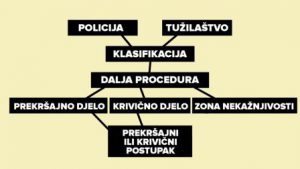VIDEO: What to do if you are witness or victim in the case of bias motivated crimes
 Bias-motivated crimes are crimes which aim to plant a seed of fear and unsafety within the community to which they are directed. The main characteristic of hate crimes is that they are motivated by prejudices and stereotypes towards certain social groups. Motivation based on prejudice is identified when the victim is selected on the basis of his or her characteristics which are common within their social group or so-called protected characteristics. These characteristics are specific characteristics or manifestations shared by certain social groups, for example, race, religion, ethnicity, language, sexual orientation, gender identity, disability or other characteristics.
Bias-motivated crimes are crimes which aim to plant a seed of fear and unsafety within the community to which they are directed. The main characteristic of hate crimes is that they are motivated by prejudices and stereotypes towards certain social groups. Motivation based on prejudice is identified when the victim is selected on the basis of his or her characteristics which are common within their social group or so-called protected characteristics. These characteristics are specific characteristics or manifestations shared by certain social groups, for example, race, religion, ethnicity, language, sexual orientation, gender identity, disability or other characteristics.
Special attention should be given to clarification of hate crimes, because, even if those are less dangerous incidents, they can be generators of conflict because they have the potential to escalate and can lead to an increase of tension in the community. When conflict, for which there is a doubt it could be committed out of hate and prejudice, happens, efficient response of the competent authorities is a signal to the affected community that appropriate measures are being taken and that these kinds of crimes are being treated seriously because of the possible consequences that such an incident can leave. Effective prosecution of bias-motivated crimes is very important, in order to send a message that such crimes will not be tolerated. This will prevent future incitement of hatred against individuals belonging to certain social groups.
What we, as citizens, can do to combat hatred-motivated crimes?
In order to prevent and combat hatred-motivated crimes, each individual can make his or her own contribution. First of all, we can report these incidents to competent authorities and fully cooperate to help their efficient processing.
What if I am a victim or witness of a hatred-motivated crime?
- If you are a victim or a witness to the incident (e.g. threats, physical assault, desecration of religious sites, writing offensive graffiti), it is important to report the incident to the nearest police station in person or by telephone as soon as possible, or contact the nearest prosecutor’s office. This is extremely important because if the case is not filed, no one can be expected to provide protection to the victim or to sanction appropriately the perpetrator.
- When reporting a case or incident, it is essential to give a precise location where the incident occurred, as much information as possible about what you have experienced or seen, and if you believe that the act was motivated by hate or prejudice, be sure to emphasize this fact, illustrating all the details at this point.
- The Prosecutor’s Office and the police will give the qualification of the act and then forward the case further to the next procedure. Depending on the evidence collected, the work can be qualified as a misdemeanor, criminal act, or will remain in the zone of impunity. Depending on the qualification, you can lead a misdemeanor or criminal proceedings before the court. In both cases, you can be called to testify.
- If your human rights have been violated or you have been hurt, injured or threatened, you have right to compensation that can be achieved before the court.
- The process is terminated by a final judgment.
It is important to emphasize again that reporting the crimes to the police or prosecutor’s office is a prerequisite for all next steps in the process.
In addition, everyone can act preventively.
Get involved and support the activities of the organizations and networks that combat hatred, hate crimes and promote tolerance.
Start initiatives in your local community to organize events that promote tolerance, coexistence, unity, and respect for diversity.
Through social networks and in your everyday life, spread useful information and positive news to break prejudices.
Contact local authorities, and build with them partnerships: introduce them to your work, promote the Action Plan on cohesion in the community if it is adopted or if there is one, or talk about the need to introduce such a plan in your community.
Report causing, encouraging and inciting hatred and violence that you encounter on the web portals to the Press Council in Bosnia and Herzegovina.
Report causing, encouraging and inciting hatred and violence that you see and hear on radio or television to the Communications Regulatory Agency of Bosnia and Herzegovina.
bias motivated crimesjudiciarypoliceprejudice and stereotypesprotected characteristics